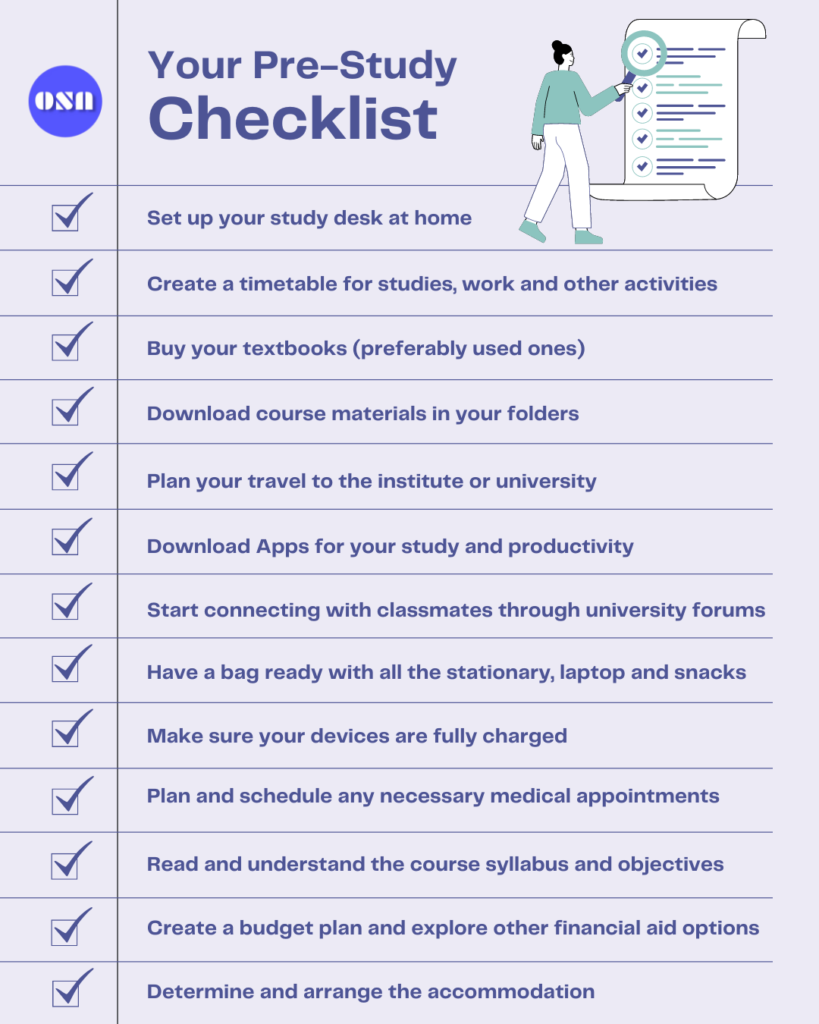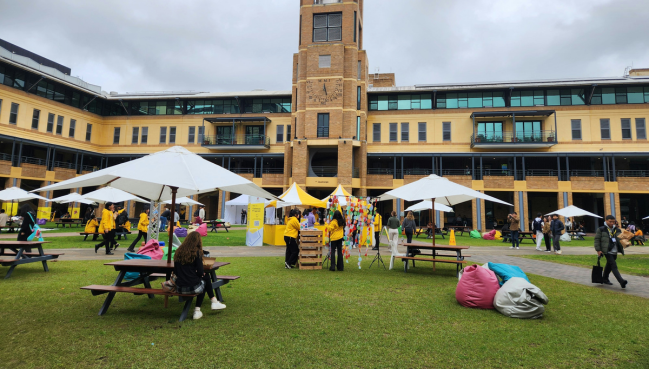Preparing For a New Semester in Australia: Your Pre-study Checklist

It is important for any student to have a pre-study checklist when starting your academic journey to ensure that you are fully prepared for the new semester.
A pre-study checklist is a list of important items and tasks that you should complete before starting your semester.
The purpose of a pre-study checklist is to help you plan, organise your schedule and set academic goals as you go through the semester.
Here are some things you need preparing for a new semester in Australia:

Set Up Your Study Desk At Home
Setting up your study desk at home is an essential pre-study checklist item to ensure that you have a designated space that is conducive to productivity and concentration.
Here are some key tips to consider when setting up your study desk:
- Find a quiet, well-lit space: Ideally, your study desk should be in a quiet area free from distractions. Look for a well-lit space with natural light or a good lamp to help prevent eye strain.
- Choose a comfortable chair: Your chair should be comfortable and provide good support for your back. Avoid chairs that are too soft or too hard, as they can cause discomfort and strain.
- Use a desk with enough space: Choose a desk that provides enough space for your computer, textbooks, and other study materials. If you have limited space, consider using a wall-mounted desk or a foldable table.
- Organise your materials: Keep your study materials organised and easily accessible. Use bookshelves, file cabinets, or desktop organisers to keep your textbooks, notes, and stationery in order.
- Minimise distractions: Remove any distractions from your study area, such as your phone or other electronics that are not related to your studies. Consider using noise-cancelling headphones to block out external
Create A Timetable For Studies, Work And Other Activities
Creating a timetable for studies, work, and other activities is an essential step in preparing for a study semester at the university.
Creating a timetable helps you manage your time effectively, organise tasks and ensure you are making progress steps towards academic and other personal goals.
Creating a timetable involves understanding your class schedule, work schedule, and other programs such as club activities, social events, and other personal responsibilities.
Buy Your Textbooks (Preferably Used Ones)
Buying used textbooks is a smart option, as they are much cheaper than new textbooks and provide you with the same information needed.
You can check with your university bookstore or library to find textbooks that are in good condition.
As a student, you can also consider buying digital versions of textbooks, which can be more affordable and convenient.
Create A Folder In Your Laptop For Each Study Unit
Creating a folder in your laptop for each study unit is a very helpful thing for your studies.
This will be very helpful for you to keep all your course materials and documents in a designated folder and make it available for easy access.
When creating a folder for each study unit, you should include all relevant materials such as lecture notes, study guides, readings, assignments, and any other important documents related to the course.
Having designated folders also helps you stay current with allocated assignments and course requirements.
Download Course Materials In The Folders
Many universities make use of online learning management systems for students.
You need to download and organise these materials in designated folders on your computer or other devices for easy access and reference throughout the semester.
This includes lecture slides, readings, assignments, and any other course-related documents.
By downloading and organising course materials in folders, you can stay on top of your coursework, avoid missing deadlines, and better prepare for exams and other assessments.
You can read more about assignments in Australia for international students here.
Mark The Calendar With Important Dates Like Exams, Assessment Due Dates Etc.
Marking the calendar with important dates like exams, assessment due dates, and other deadlines is essential as this will help you plan your study schedule effectively and avoid missing important deadlines.
When marking the calendar, you can take advantage of marking out important dates, such as midterm tests, exams, assignments, and project deadlines.
You can also mark out non-academic events, such as guest lectures, workshops, or field trips.
This also allows you to allocate enough time for research, writing, and revision, and ensure that you are well-prepared for assessments and exams.
Plan Your Travel To The Institute Or University
Planning your travel to the institute or university is very important before starting a study semester.
Getting to school on time would help you settle down properly without any rush or stress which can help you start the semester conveniently.
When planning your travel, it’s essential to consider the following:
- Mode of transportation: Determine whether you will be driving or taking public transportation to your institute or university.
- Distance and time: Estimate the distance from your home to the institute or university, and estimate how long it will take to get there.
- Transportation schedule: Find the schedule for public transportation and ensure you have sufficient time to get to your destination.
- Accommodation: If you will be staying in accommodation near the institute or university, ensure you have booked your room or apartment in advance.
Understand The University Map And Location Of Lecture And Tutorial Rooms
Familiarising yourself with the university’s routes and the locations of classrooms, lecture halls, labs and tutorial rooms will help you get to places faster during the semester.
By reviewing the university map, you can locate the buildings and facilities you will need, such as the library, cafeteria, and student center. You can also plan your routes to classes and avoid getting lost or arriving late for lectures and tutorials.
Download All The Apps That Might Help You For Your Study And Productivity
In this ever-developing digital age, there are many apps that can help you organise your academic and work life, manage your time, and improve your productivity level.
There are some apps that would be really helpful for students, like note-recording apps, such as Evernote, Notion or OneNote which allows students to take down notes during lectures and organise them all in a single place.
Time management apps like Trello or Asana can help create to-do lists, prioritise your tasks and set reminders.
Apps like Forest can help you stay focused and avoid unnecessary sites and other phone application distractions while studying.
You can check all the Free productivity apps for students here.
Start Connecting With Your Classmates Online Through University Forums
Online forums are a great way to communicate with fellow students, discuss coursework, share study materials, and form study groups.
By connecting with classmates online, you can get to know one another before the semester begins and establish a support network.
University forums can be accessed through the university’s online platform or social media groups.
Students can post introductions, ask questions, and participate in discussions. It is a very good opportunity to learn from others and gain insights from different individual perspectives.
By building relationships early on, you can find potential study partners and develop a sense of community, which can be helpful when preparing for exams or completing group projects.
Have A Bag Ready With All The Stationary, Laptop And Snacks
This is a valuable tip for students who plan to stay out longer for studies, or attend a study group gathering, or study at the library.
Making sure to pack all necessary stationery, food and devices in a bag will definitely help you save time and ensure that you have everything you need.
Some essential items to include in the bag may be pens, highlighters, a notebook, a laptop or tablet, some healthy snacks like fruits, a water bottle, and charging cables.
Having a pre-packed bag will help you avoid the last-minute rush and prevent you from forgetting important items at home.
Check all the uni essentials you need with a free checklist here.
Make Sure Your Devices Are Fully Charged
Having your devices well charged before setting out is very helpful. With most coursework being done online, students heavily rely on electronic devices to complete assignments, access learning materials and communicate with professors and peers.
By ensuring that your devices are fully charged, you can avoid interruptions during your study sessions and stay productive without worrying about running out of battery.
It’s also a good idea to have chargers and power banks readily available in case of emergencies or when studying in locations without easy access to power outlets.
Plan For And Schedule Any Necessary Medical Appointments Before Starting the University
It is crucial to take care of any health concerns before the semester begins so that you can focus on your studies and other activities without being distracted by health matters.
You can schedule appointments with their doctors, dentists, or other healthcare providers as necessary for medical checkups.
It is also a great idea to keep copies of your medical records, for example, immunisation records and blood test records, because they might be needed during emergencies or for paperwork.
Read The Course Syllabus And Understand The Course Objectives, Expectations, And Grading Criteria
Reading the course syllabus and understanding the course objectives, expectations, and grading criteria is an essential pre-study checklist item for a study semester.
The course syllabus contains essential information about the course of study, the learning outcomes, assignments or projects, and due dates.
By reviewing the course syllabus, you can understand what is expected of you and plan your study schedule accordingly.
You can also identify any potential challenges or areas that require more attention, such as difficult assignments or exams.
Understanding the course objectives is very important as it help you thoroughly understand the scope of what you will be learning through the semester.
This will help you stay focused and motivated and ensure you are meeting the learning outcomes.
Create A Budget Plan And Explore Other Financial Aid Options
University education can be costly, and students need to clearly understand their financial situation before starting the semester.
Students should create a budget plan that outlines their income and expenses and helps them track their spending throughout the semester.
You can get a free budget plan template from the Australian Government website, Money Smart.
Learn on how to avoid debt trap as an international student in Australia.
Determine What On-Campus Or Off-Campus Housing Options Are Available And Make Necessary Arrangements
You should do your research on the available accommodation options in the area, including on-campus dormitories and apartments, as well as off-campus alternatives such as rentals or sharing a room with roommates.
When making housing arrangements, you should consider budget, location, safety, and proximity to campus.
On-campus housing may offer convenience, but it can be more expensive than off-campus options.
Off-campus housing may offer more affordable options, but transportation and safety should also be considered.
You need to make housing arrangements as early as possible, as popular housing options may fill up quickly.
Studying in Australia comes with exciting and amazing experiences, and for your smooth journey through school, you are required to plan and prepare well in advance.
To make the most of your study semester in Australia, it is essential to have a pre-study checklist to ensure that you have everything in order before you leave.
We wish you all the best.


